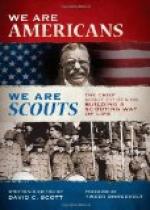I do not think I ever saw men enjoy a meal more than these did that night. We had all ridden hard that day and had only a light lunch at midday, so we were all very hungry and young and hearty and just at the time of life when food tastes best, and every one of us knew how to broil Buffalo meat over sage brush fire.
The next morning the Capt. told the men to all cut enough meat from the Buffalos to last until the next day and to put it in their packs, for, he said, “We may not meet with as good luck again as we did today, and if we take the meat with us we will be provided for anyway.”
We were on the road early in the morning and traveled without stopping until noon, and we saw numerous small bands of Buffalo all along the way. We stopped on the bank of a little pearling stream of cold water, where there was plenty of grass for the horses, and ate our luncheon and rested about an hour. We were about ready to continue our journey when I discovered a small band of Indians coming up the trail.
I sang out to the Capt., “There come some of our neighbors.” He looked at them and said, “Boys, mount your horses and be ready, for we are going to have fun right here.” I said, “Hold on, Capt., and let me see if I can’t settle this thing without a fight.” He said, “How will you do it?” I said, “I believe I know all those Indians, but I will ride down and meet them and see, and if I am acquainted with them we will have no trouble with them.”
Capt. McKee said, “Won’t you be taking a desperate chance, Mr. Drannan, in going to meet those savages when you are not sure whether you know them or not?” I said, “I am not afraid to go to meet them, but if anything is wrong, I will signal to you by raising my hat, and if I do so you must charge at once, but if I give no signal you may be sure everything is all right.”
I started my horse at full speed down the narrow valley to meet the approaching Indian band. When I was within a hundred yards of them, they recognized me, and they all began crying, “Hi-yar-hi-yar,” which translated into English means, “How do-yo-do,” and in a few minutes, they were all swarming around me, each one trying to shake my hand first. I shook hands with all, and I then asked them where they were going. The Chief told me that they were going to their village, which was on the opposite side of the river. We had passed their village a few hours before, but owing to the timber being so thick we did not notice it. They wanted to know when I was coming to trade for Buffalo robes with them. I told them I would come in four months. This seemed to please them well, and they said they would have a plenty of robes to trade for knives and rings and beads.
I rode back with my Indian friends to the camp. On the way I told the chief where I was going, and that the white men he saw in the camp were my friends and were going with me. Not knowing any of the men in the camp, the Indians passed on without stopping, as is their custom when they are not on the war path.




